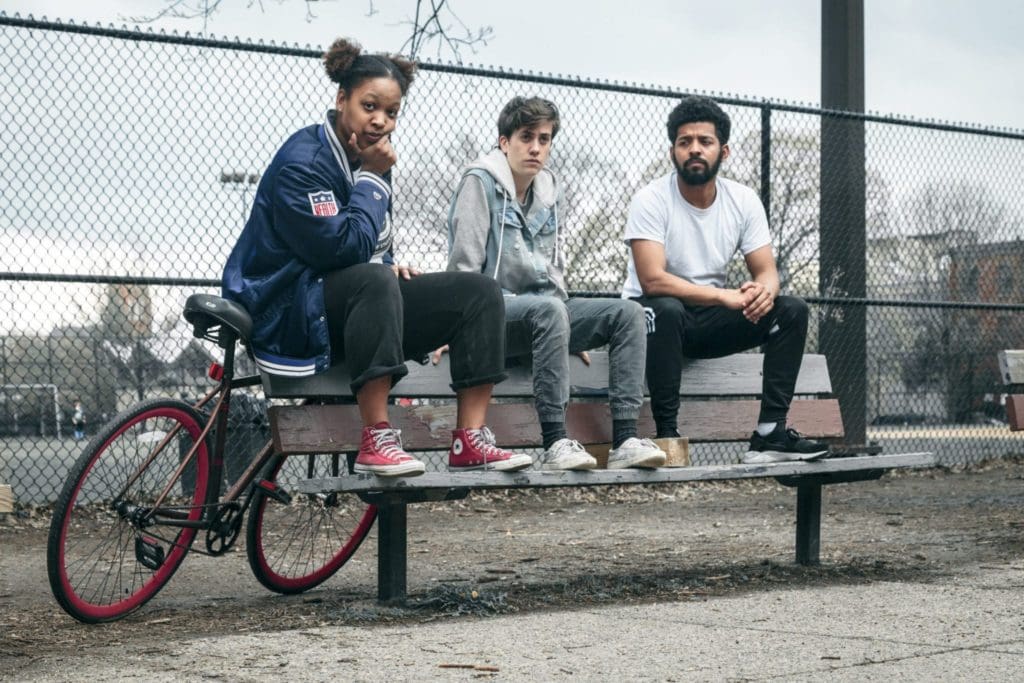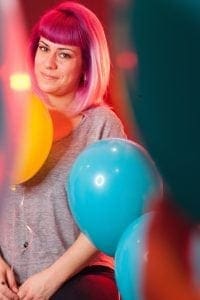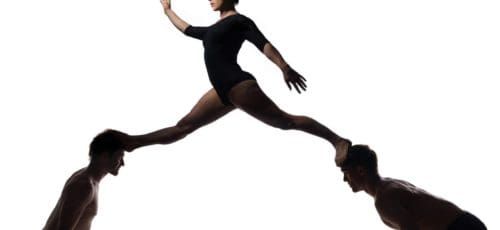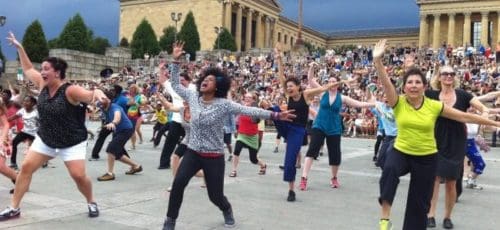Sam Tower Straps On Her Director’s Helmet For Simpatico’s Red Bike
Sam Tower is a longtime Fringe Festival favorite, having participated in at least six Festival shows since 2009. Her newly renamed production company, Ninth Planet produced Festival hits 901 Nowhere Street (2016) and Strange Tenants (2017).
This month, she’s teaming up with Simpatico Theatre as director for Red Bike, a play written by Caridad Svich that follows an 11-year-old child who, while riding a bike, discovers a world bigger than they could have imagined. We asked Sam about the play, her directing, and her newly rebranded company.
FringeArts: How did you become involved in this project?
Sam Tower: When Allison Heishman became the new artistic director of Simpatico Theatre, it was clear that her talents as a producer and director would support the community-centered mission of the company, and that she would continue to bring imaginative, socially driven new work to Philadelphia. Well, she decided to waste NO time in getting a new season up on its feet. She approached me as a director for Red Bike, and upon my first reading of Caridad’s play I was shook/enthralled/conflicted/inspired… all the things you want to be when beginning a new artistic process.
FringeArts: What appeals to you about Caridad Svich’s writing and this play in particular?
Sam Tower: The play is direct address from the perspective of “The Kid”, an 11-year-old. “The Kid” is a detailed storyteller, and also a dizzying narrator, taking you down winding curves and tunnels of memory, fantasy and vulnerable confessions of the pre-adolescent person. The play is cyclical, raw and poetic, and the language is so vibrant — dreamy and cutting at the same time. On first reading, I was already seeing three bodies in space as The Kid and hearing percussive musical scoring inside my head — that’s when you know you have to go for it. I quickly brought Jordan McCree and Andrew Nittoli of ILL DOOTS on board as live musicians to score this Kid’s epic afternoon on their bike.
FringeArts: How does directing this play fit into your other work?
Sam Tower: Caridad has written, “Writing for live performance is about writing for the body. It’s all in the body,” which speaks to my artistic process so directly. The rhythm and physicality of the body are integral in the work I make with actors. Athletic physicality is a vessel to be filled, a container for our deepest rivers of unexplainable expression. Those experiences must be held somehow. And in this play, they live in between the details, in lives in the long strings of broken words, they live in the music, and in the body.
FringeArts: Svich wrote in Howlround that “writing for theater is an act of resistance” Does this align with your view of theater?
Sam Tower: Making live theater is the closest thing I know to communing spiritually. To stop your world and choose to watch/experience performance can feel like an act of resistance against a productivity-obsessed culture. It feels that way for me. My time in the studio and in the theater is an act of resistance against the patterns of my own life. To spend your time creating a time-based art requires a deep desire to resist a traditional life cycle.
The cost-benefit analysis of theater is so difficult to measure, almost impossible, that it feels like resistance to continually choose to produce it. You have to know very deeply in your heart that people need art, ALL people need art. And that in order for ALL people to have access to art, we need to continually make it more accessible. We need to make the very best work for children. We need to open up our modes of performance to include people of all abilities. We need to ask our communities what they need and respond with art that reflects it honestly, with beauty and complexity. Representation not only matters, but it is mandatory.
FringeArts: That view fits in with Simpatico’s model too, doesn’t it?
Sam Tower: Removing the long-standing barriers to entry around theater events requires a deep, long-term investment in equity. The pay-what-you-can model is being championed by Simpatico after Allison experienced its impact with Azuka Theatre, and that in itself, is a choice to resist the values of capitalism.
I’m also talking a lot louder these days about how new plays deserve more time in the studio! Funding for the arts in the United States does not support professional artistic companies in a way that allows them to thrive in the economy they are expected to function inside of. Theater professionals are working six jobs at one time in order to fund the work of their small producing companies. And while the hope of change seems distant, I cannot stress the dilemma of this disproportionate system enough! If Red Bike teaches us anything, it’s not to accept injustice as “the way things are now.”
Fringe Arts: What are you talking about during rehearsals?
Sam Tower: What are we NOT talking about in rehearsal?? This text is very vast, but also very immediate. Most of the narrative is told within a very small amount of time — during which The Kid is experiencing a near death experience… you could say it’s as if their life flashes before their eyes, but really, it’s our collective narrative that flashes before us as an audience. Once the performers roll in, there’s no stopping this runaway train. Torez Mosley, Freddy Amill and Emily Johnson deliver a spherical narrative assisted by set designer Petra Floyd’s surreal upending physical environment.
We’ve asked ourselves these questions continually: How are we knitting together thought and behavior as three individuals playing the same person? How do we allow The Kid to meet the actors where they are, rather than the actors striving to meet The Kid? Dramaturg Zandra King asked the other night, “What is it you want to change in this moment? How does that need become action?” The relationship between thought, decision, and muscle memory is fascinating in this work, and we’ve been spending a good deal of time unpacking how to bring your authentic self to the collective consciousness of The Kid.
Fringe Arts: What were some themes you wanted to bring out?
Sam Tower: It feels to me like this play is an excavation of empathy. Last night we discussed this quote from Caridad, “How do we apprehend, register, and witness tragedies? How can we make ourselves resistant to ‘compassion fatigue’?” Red Bike could be a response to the senseless violence that we’re seeing / feeling / and forgetting in this world. And the tools of survival we have learned that allow us to turn away from the inconceivable horrors of war, colonialism, displacement and poverty that are part of our nation’s past and present.
It could also be a rallying cry to all the sleepy adults who’ve forgotten to count the details. It could be a reminder to us all to that we can’t stop making dream lists just because someone we love tells us we can’t be a helicopter or a superhero or a lionbeastunicorn when we grow up. It is definitely a play that kids approaching adolescence should see, because it’s a very unapologetic rendering. It hits you right in the place of growing up when you’re trying to figure out how to keep honoring yourself and your intuition in the face of a world that tells you to Be Quiet, Go Play, Don’t Wanna Hear It, Don’t Have Time, We Know Better…… and everyone in rehearsal agrees that figuring out how to honor yourself is a life-long journey.
FringeArts: Svich grew up in Philadelphia when East Spring Garden Street was a center for an Hispanic community. Was this a connection you discussed?
The creative team of Red Bike is really thrilled to be staging the first full production of Caridad’s work here in Philly. While the play references the middle of America several times, we can’t help but bring a lot of our experience with Philadelphia into the room. I think we’re holding space for Svich’s Philly upbringing, even if this play locates itself in a smaller town. There’s a running theme of lineage and ancestral bloodlines in the text, and in the room, there is an honoring of the generations who came before us, wherever we’re from. Among all designers, actors, and creative team there is a deep connection with the beauty and complexity of the people who live here in Philly.
Many of the artists on board were brought up in and around Philadelphia. Actor Freddy Amill grew up in a Puerto Rican community of North Philadelphia, and so the intersections for him are very close to home. The ongoing gentrification of North Philadelphia is a beacon that cannot be dismissed as we work through the narrative of The Kid. They are a conduit for the tension that results when developers move in and condos sprout up all over the neighborhood. Who are these people that own half the town? That are buying up all our houses and usual places? The Kid asks with directness and honesty. These questions break open feelings of displacement, but also a longing for adventure beyond yourself.
Caridad writes that “there is always a push-pull in my work between longing for settled life and embracing the unsettled.” The trauma that results from the dismissal of history is an undercurrent of the play, and that feeling is not lost on the folks in the room.
FringeArts: Your own company has been undergoing changes.
Sam Tower: Yes, my company has just rebranded itself as Ninth Planet. We’re still a platform for feminist performance. We’re still committed to evolving the process of collaborative authoring, and delivering story through physicality, music and installation as vehicles. Nia Benjamin is now the co-artistic director with me, and that is fantastic news for us all. If you’re not familiar with her yet, you will be soon, because she is a powerful presence on the Philadelphia theatre scene. She brings thoughtfulness, vision and enormous passion to each moment of our work together. Ninth Planet’s leadership also includes my long time collaborators Jeremy Gable, as narrative developer, and Katie Croyle, as creative advisor. As an artistic company, we practice feminism that is intersectional and inclusive of all gender identities.
FringeArts: What can we expect from Ninth Planet in the future?
Sam Tower: This platform is a home for our collaboratively made projects, which will now be created for a more diverse age range. We have several works for young audiences on the horizon. We’ve partnered with actor/educator/activist Brandi Burgess to develop an electro-pop musical for teens inspired by Francesca Lia Block’s young adult novel series, Dangerous Angels, in early development this year. Nia will be engaged in a July residency for a new piece called the kitchen table, inspired by the work of Carrie Mae Weems, centering the experience of the Black Womxn.
We’ve also been planning a performance installation for children under 2 years old called HOMEWORLD. I have been deeply moved by the dazzling performance being created for babies in other cities in the US and internationally, and I have dedicated my time this season to creating a gently immersive performance for Philadelphia babies. This 40-minute installation experience will be a collage of electronic sound, surprising movement scores, and interactive play with soft objects inspired by coral and ocean creatures. I’m working with production designer Tess Kunik to develop an installation specifically for the attention and curiosity of babies under age 2. With this project, Ninth Planet aims to create a fresh new space for families with very young children to experience live art together. HOMEWORLD will premiere publicly in October 2018.
FringeArts: What are you looking forward to in this year’s Fringe Festival?
Sam Tower: I am taking a break from the Festival this year to focus on Ninth Planet’s other projects. That being said, you should keep your eyes out for a Fringe show I highly endorse. A remount of Jeremy Gable’s one man show, Idaho Shuffle, produced by Simpatico Theatre as part of the 4Solo series unpacking and subverting socialized conventions of manhood.
—Alyssa Kerper & Christopher Munden
What: Red Bike
When: June 6-24, 2018
Where: Caplan Studio Theater, 211 S. Broad Street, 16th floor
Cost: Pay What You Decide
simpaticotheatre.org/discover
Featured photo by Daniel Kontz.





